
Current Addiction Reports
Scope & Guideline
Driving innovation in addiction treatment methodologies.
Introduction
Aims and Scopes
- Substance Use Disorders (SUDs):
The journal covers a wide array of studies related to substance use disorders, including alcohol, opioids, cannabis, and other substances, focusing on their prevalence, treatment, and societal impact. - Behavioral Addictions:
Research on behavioral addictions such as gambling, gaming, and problematic internet use is a core area, exploring the psychological and social factors contributing to these behaviors. - Psychosocial Factors:
The journal examines the psychosocial mechanisms influencing addiction, including minority stressors, emotional regulation, and social influences, particularly among marginalized populations. - Intervention and Treatment Approaches:
Current Addiction Reports emphasizes innovative treatment methodologies, including pharmacological interventions, psychotherapeutic approaches, and digital health solutions for managing addiction. - Health Equity and Disparities:
The publication focuses on health disparities related to addiction, addressing the unique challenges faced by various racial, ethnic, and gender groups, and promoting culturally responsive treatment. - Neuroscience and Addiction:
The journal integrates findings from neuroscience to understand the biological underpinnings of addiction and the effects of substances on brain function and behavior.
Trending and Emerging
- Intersectionality in Addiction:
There is a rising trend in exploring the intersectionality of addiction, particularly how race, gender, and sexual orientation influence substance use and treatment outcomes, reflecting a growing awareness of health disparities. - Digital Health and Interventions:
The use of digital health technologies and mobile applications for addiction treatment and prevention is gaining attention, showcasing innovative approaches to engage individuals in recovery and support. - Psychedelics and Novel Therapeutics:
Research on the therapeutic potential of psychedelics for treating substance use disorders is emerging as a significant focus, indicating a shift towards exploring alternative treatment modalities. - Co-occurring Disorders:
There is an increasing emphasis on understanding and treating co-occurring mental health disorders alongside substance use, highlighting the need for integrated care models. - Impact of Social Media and Technology:
The influence of social media and technology on addiction behaviors, especially among youth, is a trending topic, reflecting changes in how individuals interact with substances and behaviors. - Neuroscience of Addiction:
Advancements in understanding the neurobiological mechanisms of addiction, particularly regarding impulse control and emotional regulation, continue to be a prominent area of research.
Declining or Waning
- Traditional Substance Use Studies:
There appears to be a decreasing focus on traditional studies of substance use prevalence without considering broader psychosocial contexts, as the journal increasingly emphasizes intersectionality and the multifaceted nature of addiction. - Single Substance Focus:
Research that solely focuses on individual substances, such as isolated studies on alcohol or nicotine without considering poly-substance use or co-occurring disorders, is becoming less prevalent. - Generalized Treatment Approaches:
There is a waning interest in one-size-fits-all treatment recommendations, with a shift towards personalized and culturally responsive interventions that consider individual differences and specific community needs. - Legal and Policy Perspectives:
While legal and regulatory discussions have been important, there is a noted decline in articles solely focused on legal aspects of addiction without integrating health equity and social justice considerations. - Basic Neuroscience Studies:
Research that does not connect neuroscience findings to practical treatment applications or psychosocial implications is less frequently published, as the journal seeks to bridge the gap between basic science and clinical practice.
Similar Journals
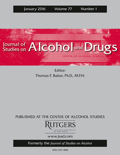
Journal of Studies on Alcohol and Drugs
Transforming understanding of alcohol and drug dynamics.The Journal of Studies on Alcohol and Drugs is a premier academic journal dedicated to advancing the understanding of alcohol and drug use, its effects, and its societal implications. Published by ALCOHOL RES DOCUMENTATION INC at the Center for Alcohol Studies, Rutgers University, this journal features comprehensive research that spans the disciplines of health, psychiatry, mental health, and toxicology. With its Q1 ranking in Health (Social Science) and Q2 ranking in Psychiatry and Mental Health, the journal plays a vital role in disseminating high-impact research that informs policy, prevention, and treatment strategies in addiction and substance use. The journal contributes significantly to the field, as evidenced by its solid Scopus rankings and engagement with contemporary issues, making it an essential resource for researchers, practitioners, and students. Although it does not offer open access, the journal's commitment to rigorous peer review and scholarship ensures that it remains at the forefront of research on alcohol and drugs through its converged publication timeline from 2007 to 2024.

PSYCHOLOGY OF ADDICTIVE BEHAVIORS
Pioneering Research on the Psychology of AddictionPsychology of Addictive Behaviors, published by the Educational Publishing Foundation of the American Psychological Association, is a distinguished peer-reviewed journal dedicated to advancing the understanding of addiction through rigorous psychological research. With an impressive impact factor and a reputation for excellence, this journal holds a prestigious Q1 quartile ranking in Clinical Psychology, Medicine (miscellaneous), and Psychiatry and Mental Health as of 2023. Since its inception in 1993, it has provided a vital platform for the dissemination of high-quality studies, fostering collaboration and knowledge exchange amidst researchers, clinicians, and students in the mental health arena. The journal is particularly noted for its comprehensive coverage of diverse topics related to addictive behaviors, thereby contributing significantly to the field's evidence base and clinical practices. Although currently not open access, its commitment to scholarly excellence ensures that subscribers benefit from invaluable insights into the complexities of addiction. With the culmination of research spanning from 1993 to 2024, Psychology of Addictive Behaviors stands as a cornerstone for those striving to understand and combat the challenges of addiction.
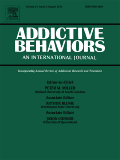
ADDICTIVE BEHAVIORS
Advancing Understanding of Addictive BehaviorsADDICTIVE BEHAVIORS is a prestigious journal published by PERGAMON-ELSEVIER SCIENCE LTD, specializing in the critical examination and exploration of addiction-related issues across diverse fields including Clinical Psychology, Psychiatry and Mental Health, and Toxicology. With a robust history dating back to 1975 and convergence extending to 2024, the journal is esteemed for its rigorous peer-reviewed research that contributes significantly to understanding addiction phenomena. Ranked in the Q1 category for its focus areas, it stands out within the academic community, evidenced by its impressive Scopus rankings—25th in Clinical Psychology and 14th in Toxicology—placing it in the top tier of its disciplines. This journal offers valuable insights into addiction behaviors, treatment methodologies, and public health implications, making it an essential resource for researchers, practitioners, and students seeking to advance their knowledge and impact the field. Although not Open Access, it provides vital access options for institutions and individuals invested in addiction studies.

Substance Abuse Treatment Prevention and Policy
Leading the charge in substance abuse treatment and prevention.Substance Abuse Treatment, Prevention, and Policy is a premier open access journal published by BMC, dedicated to advancing the understanding and improvement of substance abuse treatment and prevention strategies. Since its inception in 2006, this journal has established itself as a significant resource in the fields of Health Policy and Psychiatry and Mental Health, proudly maintaining a strong reputation reflected in its 2023 Scopus rankings, which place it in the top quartiles of these categories. With an impactful focus on policy implications and evidence-based practices, the journal's comprehensive coverage supports the sharing of innovative research and perspectives aimed at mitigating substance abuse challenges worldwide. Open access since its launch, it ensures that vital research is readily available to researchers, practitioners, and students alike, facilitating collaboration and discourse in this critical area of public health. Its commitment to high-quality research is underscored by its rankings within the 78th percentile for Health Policy and 66th percentile for Psychiatry and Mental Health, highlighting its influence and relevance in addressing pressing issues in substance misuse.
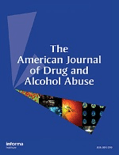
AMERICAN JOURNAL OF DRUG AND ALCOHOL ABUSE
Championing Scholarly Discourse on Substance AbuseAmerican Journal of Drug and Alcohol Abuse is a highly regarded publication in the field of substance abuse research, published by Taylor & Francis Inc. With its inception in 1974, this journal has become an essential resource for scholars and practitioners interested in clinical psychology, psychiatry, and the multifaceted issues surrounding drug and alcohol use. It holds a notable Q2 ranking in Clinical Psychology, Medicine (miscellaneous), and Psychiatry and Mental Health, emphasizing its impact and relevance in these domains. The journal's 2023 Scopus rankings further highlight its standing, placing it in the top quartile of publications with established readership and citation metrics. Researchers and students can benefit from its comprehensive articles that delve into the complexities of substance use, treatment methodologies, and the socio-psychological underpinnings of addiction. Whether you seek to access cutting-edge studies or contribute to ongoing discourse in the field, the American Journal of Drug and Alcohol Abuse serves as a vital hub for knowledge dissemination and scholarly engagement.
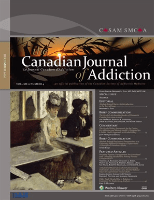
Canadian Journal of Addiction
Illuminating the path to understanding addiction.Canadian Journal of Addiction is a leading platform dedicated to advancing the understanding of addiction and its multifaceted impacts on individuals and society. Published by LIPPINCOTT WILLIAMS & WILKINS, this journal aims to foster rigorous research and discussion in the field of addiction studies, contributing significantly to the intersection of psychiatry and mental health. With its ISSN 2368-4720 and E-ISSN 2368-4739, the journal is indexed in Scopus and has been categorized in the Q3 quartile for 2023, reflecting its emerging influence amongst peers. The Canadian Journal of Addiction facilitates a vital exchange of ideas and findings, crucial for researchers, practitioners, and students alike, addressing pressing issues related to addiction through innovative studies and insightful reviews. Subscribers and readers benefit from the latest findings as they navigate through the dynamic landscape of addiction research, enriching both academic knowledge and practical applications.
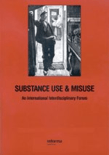
SUBSTANCE USE & MISUSE
Empowering professionals with evidence-based insights on substance misuse.SUBSTANCE USE & MISUSE, published by Taylor & Francis Inc, is an esteemed academic journal dedicated to the multifaceted study of substance use and its implications on health and society. With a notable impact factor and categorized in the Q2 quartile across multiple fields—including Health (Social Science), Medicine (Miscellaneous), Psychiatry and Mental Health, as well as Public Health—this journal serves as an essential platform for researchers, professionals, and students alike. Spanning from 1966 to 2024, it provides a rich archive of peer-reviewed articles that explore current trends, innovative research, and evidence-based practices in the management and understanding of substance use. The journal offers various access options, catering to the diverse needs of its audience and affirming its commitment to fostering scholarly discourse in the United Kingdom and beyond. By engaging with this journal, readers can enhance their understanding of the complexities surrounding substance use, making it a crucial resource for advancing knowledge and informing policy in this critical area of public health.
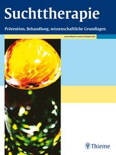
Suchttherapie
Bridging Research and Practice in Mental HealthSuchttherapie, an esteemed journal published by GEORG THIEME VERLAG KG, serves as a critical platform within the fields of Applied Psychology and Psychiatry and Mental Health. Established in 2000 and continuing through 2024, this journal is committed to advancing the understanding and treatment of addiction and related psychological issues. Although it currently stands in the Q4 Quartile ranking and is categorized as low percentile in both Scopus Ranks and impact metrics, its significance lies in its dedication to disseminating cutting-edge research and clinical findings that contribute to the evolving landscape of therapeutic practices. Published in Germany, the journal facilitates unlimited access to the vital discourse surrounding mental health and addiction treatment, making it a valuable resource for researchers, professionals, and students alike seeking to enhance their knowledge and skills in this important area of study. As the field continues to grow, Suchttherapie plays a pivotal role in bridging practice with academic rigor, ensuring that readers remain informed on the latest methodologies and insights.
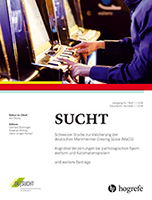
Sucht-Zeitschrift fur Wissenschaft und Praxis
Illuminating the path to understanding addiction's societal impact.Sucht-Zeitschrift für Wissenschaft und Praxis, published by HOGREFE AG in Switzerland, is a pivotal journal addressing the interrelated fields of addiction science and mental health. With an ISSN of 0939-5911 and an E-ISSN of 1664-2856, this journal has been dedicated to fostering interdisciplinary research and practical applications since its inception in 1991, continuing through to 2024. As a respected source in the field, it holds a 2023 Q3 quartile ranking in Medicine (miscellaneous), a Q4 ranking in Psychiatry and Mental Health, and a Q3 ranking in Public Health, highlighting its broad relevance and growing impact on contemporary health discussions. While currently not offering open access options, the journal provides a rich platform for researchers, practitioners, and students to share and gain insights into innovative practices and scientific findings that advance the understanding of addiction and its societal implications. With its contributions indexed in Scopus and a variety of rankings reflective of its quality, Sucht-Zeitschrift für Wissenschaft und Praxis serves as an essential resource for those committed to advancing knowledge and practice in addiction-related fields.
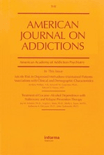
AMERICAN JOURNAL ON ADDICTIONS
Pioneering Research for Lasting Impact on Public HealthThe AMERICAN JOURNAL ON ADDICTIONS, published by WILEY, stands as a premier publication within the realms of Clinical Psychology, Medicine, and Psychiatry. With its ISSN 1055-0496 and E-ISSN 1521-0391, the journal has been a critical resource since its inception in 1992, consistently evolving to encompass a wide scope of addiction research and its implications on public health. Renowned for its rigorous peer-reviewed articles, it boasts impressive rankings, including Q1 status in both Clinical Psychology and Medicine (miscellaneous) for 2023, and a respectable Q2 in Psychiatry and Mental Health. As a foundational platform for disseminating cutting-edge research, the journal aims to facilitate the exchange of knowledge among researchers, healthcare professionals, and educators alike. Its significant impact on the academic community is underscored by its Scopus rankings—placing it in the top 26% of Clinical Psychology journals and the top 28% in Medicine (miscellaneous). By fostering an understanding of addiction and its treatments, the AMERICAN JOURNAL ON ADDICTIONS plays an essential role in guiding innovative practices and shaping future policies within the field.